Alison McGhee's Blog, page 44
June 20, 2011
The Continental Divide
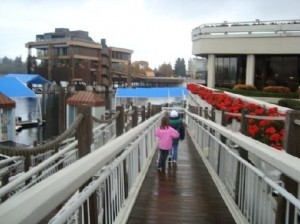 That right there is the longest floating boardwalk in the world, at least according to the sign at its entrance.
That right there is the longest floating boardwalk in the world, at least according to the sign at its entrance.
She finds this hard to believe –the very longest? in the entire world? what about all those floating boardwalks you see in movies set in places like Indonesia and the bayou and swampy places like that?– but she was willing to go along with it anyway, since a) it seems like an innocuous-enough boast, and b) she's lazy.
Her youthful companion and she happened upon the world's longest floating boardwalk after a 400-mile day in which they traversed Route 2 from Alberta to Montana and into Idaho.
When they crossed over the Montana/Idaho state line she stuck her hand as far forward on the dashboard as she could and proclaimed that she had reached Idaho before her youthful companion. The youthful companion, who was sleeping, did not respond.
She did, however, wake up shortly thereafter to proclaim that she was hungry for a Wieners of Waterton wiener. She had partaken of a wiener from Wieners of Waterton two days before, along with a side of sweet potato fries with ginger-wasabi sauce, and now could not get them out of her head.
"Wieners of Waterton is 300 miles ago."
"So?"
For a moment, the driver considered turning back and retracing the drive to Waterton, where the wieners were waiting. That this idea didn't strike her as all that farfetched is in itself the beauty of a road trip. But there were miles to go before they slept, and wieners are not, after all, an uncommon foodstuff.
Foodstuff is the singular of foodstuffs, in case you were wondering.
"There might be a Wieners of Sand Point," she informed her youthful companion, and her youthful companion agreed.
They stopped at an historical site (did you notice the "an" before the historical there? while it is grammatically correct, it sounds wrong; please know that she knows that) on the Continental Divide so that she could read all the historical markers placed there. The youthful companion remained in the car, as she was "sick of history."
When she got back in the car she informed her youthful companion that she and her sister Oatie, while spending the summer out west, had once peed on the Continental Divide.
"Why?" asked the youthful companion.
Good question. It had something to do with half-Pacific, half-Atlantic, but that's all she remembers.
On they drove. While her youthful companion slept she played several songs five or six times in a row so that she could get her fix without driving the youthful companion insane. Enormous trees rose up on either side of the road –what kind of pines could these possibly be?– and fly fishermen waded out into the current. This was A River Runs Through It country.
On the outskirts of Coeur d'Alene she realized that it was a much bigger town than any they'd been in the past week. 44,000 inhabitants. A small city. A small city with a big strip leading into and out of it, motels and casinos and tire places and five mattress stores and endless fast food.
The sight was exhausting and a huge wave of sadness came rushing through her. She didn't want to be anywhere near a strip, a city, or traffic of any kind.
In another week she would be driving back into a real city of ten, twenty, thirty times as many inhabitants as Coeur d'Alene. The thought of the cramped streets and alleys and the choked freeways was unbearable. She tried to shut her mind down and focus on the beauty of her surroundings. Mountains. Rivers. Lakes.
Right into the city center they drove, and parked by an enormous establishment that looked as if it might a giant hotel of some kind. They were making this road trip on the fly, with no reservations anywhere.
"Maybe we should stay here, at this giant hotel-looking thing," she said to her youthful companion.
The youthful companion looked doubtful.
"It's too fancy."
"Let's just check it out."
They parked and got out. They examined their car: so many bug carcasses were flattened against the front that the paint color looked visibly different. They and their vehicle had become mass murderers during the course of their road trip.
The giant hotel-looking thing turned out to be, shockingly, a giant hotel. They wandered down to the water, which is where they encountered the start of what may or not be the world's largest floating boardwalk.
"Let's traverse the length of the world's largest floating boardwalk!" she said to her youthful companion.
"Ugh," said the youthful companion.
"Ugh? Good Lord, what's wrong with you? How often do you get to walk the length of the world's largest floating boardwalk?"
The youthful companion sighed and trudged out onto the boardwalk. It truly was long. It weaved back and forth among boats and docks, all gated and locked, winding its way toward what, far in the distance, must surely be the entrance to the giant hotel.
"Let's sneak through that hole," she suggested to her youthful companion. "We'll cut off at least a hundred yards."
"No!"
"Come on!"
But the youthful companion flatly refused. Good Lord. This was the world's longest floating boardwalk, not some New York City club with velvet ropes. Had she unwittingly raised someone not willing to break the slightest of rules? Surely not.
But it was true, at least in the case of the world's largest floating boardwalk. They shuffled along behind a group of tourists walking in that obnoxious let's take up the entire width of the floating boardwalk way.
Her youthful companion was wearing socks with newly-acquired Birkenstocks. Yes, socks with Birkies, decades and decades before she would turn sixty. Or even forty.
"What are you, a hippie?" she asked.
The youthful companion smirked and made no reply. She is what she is, this youthful companion, and if that means part hippie, so be it. That is one of the many great things about this particular youthful companion.
Finally, the end of the world's largest floating boardwalk was reached. Up some stairs, a traverse across a deserted pool deck, down some more stairs, and into the giant hotel, where a very nice man named Ron informed them that yes, there was indeed a room available, with a balcony and a view, and that while it ordinarily cost $499, he would be happy to give it to them for $249.
She looked at the youthful hippie next to her. What did the youthful hippie think? The youthful hippie was not happy with the idea.
"Too fancy," she muttered.
How great this was. Positive reinforcement on many levels. She herself is chameleonic, which means that she is perfectly at home in a long gown and heels despite her diner upbringing. But when push comes to shove she'll choose the motel with free wifi! free breakfast! over the giant hotel with his 'n hers spa every time.
It does her heart good to see that apparently the youthful companion has inherited this choose-the-blue-over-the-white mentality.
Which is how they ended up at the Ameritel, with its complimentary 30+ item breakfast buffet, its guest laundry, its 24/7 free coffee and six kinds of tea, its in-room microwave, mini-fridge and coffeemaker, and its kingsize bed.
You would think that with a kingsize bed, which is pretty much the size of a football field, the youthful companion would manage to stay in a far corner, but that was not the case. No. For most of the night the youthful companion managed instead to sprawl over three-quarters of the kingsize bed. Is this a common trait among hippies?
In the morning they got up and partook of the large breakfast buffet. She made herself a make-it-yourself waffle and was approached by an older woman who wondered how those waffles were.
"Not as good as you can make at home," she said, "but pretty damn good nonetheless."
The woman was greatly intrigued and asked for step by step instructions, which, as someone who had successfully made a make it yourself waffle, she was happy to provide.
Three young men came shuffling tousleheaded and barefoot into the breakfast room and proceeded to make their own waffles. Each one forgot to flip the waffle iron and had to be instructed to do so. Each smiled and thanked the waffle instructor.
She watched the young men and made up stories about them for her youthful companion. They were college students on a cross-country road trip. No wait, they were college students with summer jobs as rafting instructors and they had decided to live in the Ameritel for the summer. Why not, given the 30+ item breakfast buffet?
She thought of the summers that she herself had spent out west, heading there jobless and finding a job and a place to live so that she could hike those mountains and wake up to that clear crisp air.
The youthful companion took a shower and washed her long river of black hair. Always terrified of blowdryers, she nonetheless decided to brave it. The sound of the blowdryer emanates from the bathroom at this very moment.
Soon they will get back in the car, destination west. At some point soon, they will have to turn back. They will have to begin the long drive to the city in which they live. Again the wave of not-wanting washes through her. She doesn't want to go back. She wants to live out here.
She tries to convince herself that the feeling is a passing one. That once she is actually back in the city, she'll be happy to be there. But that doesn't feel like the truth.
Soundtrack to Route 2
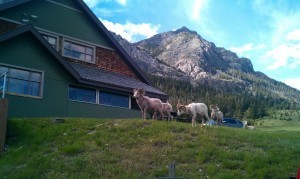 Soundtrack to Route 2: Alberta to Montana to Idaho
Soundtrack to Route 2: Alberta to Montana to Idaho
Come on now child, we're gonna go for a ride
Just our hands clasped so tight,
waiting for the hint of a spark
I don't need no dreams when I'm by your side.
We were born and raised in a summer haze
Letting the days go by, let the water hold me down
And I have filled this void with things unreal
Oh life, you are a shining path
Where it began I can't begin to knowin
In my mind I still need a place to go
All my changes were there.
What about those I've known
whose memories still live inside of me?
Radio operator, I am calling like a friend
From my future, from your memory,
and it never has to end
Ah the night, here it comes again
It's on with the jeans, the jacket and the shirt
I'll wear something pretty and white
and we'll go dancing tonight.
June 18, 2011
From the mountain: three small talks
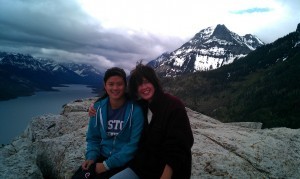 The two travelers clambered up the mountain, on the lookout for the bears sighted earlier and the cougars known to be frequenting the trails. The young one stomped her feet on the rocks and the older one sang, the better to scare away the wildlife.
The two travelers clambered up the mountain, on the lookout for the bears sighted earlier and the cougars known to be frequenting the trails. The young one stomped her feet on the rocks and the older one sang, the better to scare away the wildlife.
Once they cleared treeline and reached the summit, they sat on a rock at the top of the mountain and gazed around. It was early afternoon and the clouds obscured the tops of the near and distant peaks. The wind blew steadily and strong. Chipmunks scampered about.
* * *
Small Talk #1
Youthful Companion: I want a chipmunk. Can I have a chipmunk?
Alison: Sure.
YC: Really?
A: You know I decided a while ago just to say "Sure" to every animal request you make from now on.
YC: So I can bring one of these chipmunks home with me?
A: Sure.
YC: Here, little chipmunk. Come here, little fat chipmunk. No, not you. You. You over there, little fat one.
* * *
Small Talk #2
YC: Could we pitch a tent up here tonight?
A: Sure. We might blow off the mountain in the middle of the night though.
YC (squinting against the gale force wind): Oh.
A: Maybe not, if we pound the stakes into that crevice in the rock over there.
YC: Crevice? Ugh. I hate that word.
A (deeply interested): You do?
YC: Yes. I do. I also hate other words.
A (even more deeply interested): Really? Such as?
YC: Moist.
A: Oh, that's right! You've always hated the word moist. What else?
YC: Curdled. Pus-y.
A: Pus-y? Eww.
* * *
Small Talk #3
YC (gazing down upon the roiling river and lake far below, dark peaks rearing up on both sides): Look! It's like a scene from Harry Potter!
A (picturing the Hogwarts environs): You're right!
YC (pointing): I expect to see the German school rising from the lake right, down, there.
A (pointing): And I expect to see the French school come galloping out of those pine woods right, over, there.
(Pause)
YC: Can I have a chipmunk?
A: Sure.
* * *
June 16, 2011
Waterton
At twilight the herd of elk came walking down from the mountain pass. Single file they walked, and from a distance they looked like a string of camel picking their way through a green desert.
Closer and closer they came, a dozen or more, until they congregated in a tight knot by the snow fence, a snow fence that is permanently in place, here in this land where the peaks of the mountains are always white. Where two weeks ago, in June, snow was still falling. Where waterfalls tumble into rivers that run so fast their water churns up green and brown.
The elk stood by the now-closed gate in the fence. They were used to passing through the gate at this time of day, walking across the dirt road, and grazing in the green pasture on the other side. Now there was a horse in that pasture, and so the gate was closed.
The elk stood uneasily on the other side of the fence.
If they wanted to, they could just leap it, said someone who has watched the elk for many days now. You can't believe how high they can jump.
The elk did not jump. They stood in their tight cluster, conferring. It looked as though they were having a planning meeting.
The gate is closed. What should we do?
Eventually, one of the elk turned and faced the direction from which they had come. He lifted his head toward the mountains and began walking. The other elk turned and followed. Something startled them and they began to run, back across the green meadow, up and over the rise, disappearing in the distance.
The horse in the pasture began to run then too. He had once been a wild horse, a Nokota, and someone had worked with him for years until he allowed that someone to ride him. He had acres of grassland to run on, ridges to hide behind, dips to take shelter in, and in winter his coat grew long and shaggy so that he was happy to stay outside in all weather.
Farther down the road there was a gravel pit, and a den within it that contained a fox and his family. The fox had been courted by a man who lived nearby, and over time lost his wariness enough so that he would appear at dusk and carry food given to him by the man back to his fox family.
In the nearby town, bighorn sheep lolled in the sun in front of a small church. Their coats were falling off in clumps of fur, smooth undercoat visible beneath.
The nest of a river eagle rose high beside the dirt road, long ribbons trailing from it.
You are in grizzly country, every sign at every entrance to the park read. Be aware.
June 15, 2011
The sky is everywhere, especially here
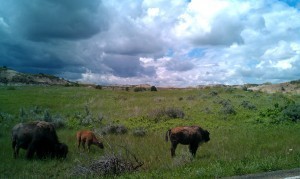 This is what will happen to you on the day you drive the length of Route 2 from eastern to western Montana.
This is what will happen to you on the day you drive the length of Route 2 from eastern to western Montana.
Before you get behind the wheel you will stand beside the car and turn in all directions, marveling at the boundless sky.
You will see the 75 mph road signs on this two-lane road and you will smile and set the cruise at 83 and the few cars on the road with you will all be going as fast as you.
It will feel as if you're flying. As if you could literally take off from the earth and rise in the air and be part of that big sky. When you have to slow to 60 it will feel as if you're crawling.
On your right will be a prairie dog city, mounds rising over an endless field, one prairie dog after another standing with tiny upraised arms, watching you pass.
You will play the music you brought with you, turning the volume way up and then way down, depending. There will be no stretch of time on Route 2 without music, new and old, to keep you company.
Dinosaurs will appear on a ridge overlooking the road, one after another. Silent, still sentries from hundreds of millions of years ago, watching over their land and you in your small car. It will take you a moment to realize that they're not real.
You will cross the Milk River early on, shallow water the color of cafe au lait, and you'll squint as you take in the magnitude of the flooding around it. Tall trees standing in water. The tires of farm machinery half-submerged. Drowned wheat.
A hand-lettered sign –brown letters on a white board– will read Women Are Sacred.
The sky will surround you, the biggest sky you have ever seen, and you will be able to see the weather in all directions, dozens of miles away. To the north: rain sheeting down from the heavens. To the east: sunshine. To the south: gathering thunderclouds. To the west, the direction in which you are headed: a clear dividing line between storm and clear skies.
Zeus is angry, your youthful companion will remark, as the sky ahead darkens.
We're heading into the jaws of the beast, you will say.
You will grip the steering wheel tighter as the sky turns black. You are driving at 81 miles per hour directly into the storm. You will look at the temperature outside: 72 degrees. Now it will read 71. Now 68.
63. 58. 56.
54. 53.
In five minutes. First you won't believe it, and you will open the window and the car will fill with cold air. You still won't believe it and so, knowing your own powers of exaggeration, you'll turn to your youthful companion and say, Did that temp just drop 20 degrees in ten minutes?
Five, she, a non-exaggerator, will say. 20 degrees in five minutes.
Into the storm you fly. Rain so hard you can't see a thing will lash the small car and wind will rock it from side to side. You will slow to 30, then 25. You will turn your hazards on, hoping that anyone behind or ahead will see them blinking. You will debate: more dangerous to pull to the side and wait, or keep going?
You will keep going.
Within minutes you will drive out of the storm and the temperature will begin to climb again.
The Milk River, a tributary of the flooding Missouri, will appear again and again. Its own tributaries will also appear –Beaver Creek, Willow Creek– and the flooding is everywhere. Whole fields submerged. Milky brown water lapping at the sides of Route 2.
You will wonder about the Milk River and its shapeshifting qualities.
You and your youthful companion will take turns choosing cd's from the stack you brought with you. As it was the day before, each song will make your heart ache, in a good way, and make you want to write a beautiful book.
Ahead, as you head west, you will see the tail end of a black cloud dipping down from the sky toward the road directly ahead of you. Having just driven through the storm, this unusual sight will not surprise you.
Into the black cloud you'll plow, to find that it is not a cloud, but a swarm of tiny black bugs that coat your windshield with bug glue. It will be hard to see. At the next tiny town, dozens of miles down Route 2, you'll pull into a gas station to scrub your windshield.
At the next pump over, a bigbellied man in cowboy boots and a cowboy hat will jump nimbly out of his truck to do the same thing.
"You get caught in that cloud of bugs too?" he will yell. "Sticky little things, ain't they?"
You will smile and laugh and scrub away. A little girl will come running out of the shack of a store by the pumps. The bigbellied man will scoop her up and hold her up against the sky.
"I didn't hardly get to see you today!" he will say, and then he will kiss her on both cheeks and she will throw her arms around his neck and laugh.
When you get hungry you will pull up to a light blue windowless supper club where the parking lot is full of trucks. Before you go in you'll trade your flipflops for your cowboy boots. Once inside you'll see that the menu, as you expected, features 18 versions of steak and two of pasta.
There will be eight large aquariums dividing the dining room. In one of them will live two albino frogs, one slender, one so fat that it must try and try again to come up for air.
Back in the car, you will not want to stop driving. The western sky will coax you onward and you will drive and drive and drive until you have driven 670 miles on this one day.
When you finally pull up to the last available motel room in a town on the western edge of Montana you will want to write a poem made up only of lines from songs you listened to as you drove, lines such as Oh life, you are a shining path, or I asked God to please slow down the seconds.
But you will be too tired to write that poem, at least today, and you will go to sleep under a sky filled with stars.
June 14, 2011
Road trip, day one
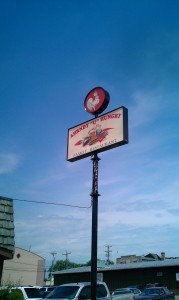 If she were a better photographer, or in fact, any kind of photographer at all, which she obviously isn't, to judge from the photo to the right there, she would know how to crop the thing. Then the "Ahrndt U Hungry" words and the accompanying chicken would appear much bigger. They would be the center of the photo, sailing up there in the blue-blue sky, just the way she imagines them looking.
If she were a better photographer, or in fact, any kind of photographer at all, which she obviously isn't, to judge from the photo to the right there, she would know how to crop the thing. Then the "Ahrndt U Hungry" words and the accompanying chicken would appear much bigger. They would be the center of the photo, sailing up there in the blue-blue sky, just the way she imagines them looking.
Surely her computer comes with some kind of software that can do that, but in her ineffectual and haphazard way, clicking around from photoviewer to photoviewer –why are there so many photoviewing programs on this thing, none of which she installed, when all she wants is one, just one adequate, easy-to-figure-out one?– she couldn't find it.
Alas, she forgot her actual camera at home, not that that would have made any difference in the quality of the above Ahrndt U Hungry photo because a) she doesn't really know how to use her actual camera, which she won in a silent auction benefit fundraiser, and b) she lost –or one of her youthful companions lost– the cable that connects it to the computer, so that all the photos contained within are currently imprisoned without possibility of parole until such date as she manages to type the camera make and model into google, figure out what kind of cable she needs, order one, and then hook the thing up again to the computer.
Whereupon several thousand, or maybe four or five, photo-viewing programs will open simultaneously, none of which, again, she really knows how to use, and she will stare dully at the newly-released photos, still not knowing how to edit them, and continue to post photos here on this blog, all with an unwritten "crappy photo" caption.
But that is not the point of this post. The point of this post is that two travelers, a woman and the most youthful of her youthful companions, set forth from their home in a large city yesterday morning. They pointed their car west and crept through incoming rush hour traffic –but they were headed out! salmon swimming against the tide!– bound for open land.
The youthful companion plugged in her iPod and chose a selection of tunes for the the first couple hours of the drive, and each song seemed like the perfect song.
Wow, thought the woman, maybe she could be a dj.
She imagined introducing people in later years to her youthful companion, the dj. How fun that would be. Also, she could probably get all the music she wanted for free, because her youthful companion would be overrun with it.
Within an hour the land had opened up.
Within three hours they had driven out of the world of endless trees and lakes into a world of giant, undulating plains.
Within five hours the trees had disappeared, giving way to unbroken stretches of fenced grassland. Dark cattle grazing solo or in small herds. Buttes rising in the distance. Piles of large rocks gathered in the middle of hayed or grassy fields.
The road straightened into a gray ribbon stretching to the far horizon. 75 mph speed limits, and out there, where no cars go, the woman set the cruise to 80. A red, freestanding barn door –no barn behind it– rose from the middle of a cowless pasture.
A steer leaned against a boulder and pushed his head and neck and shoulders against it, scratching an itch. A UPS truck, so covered in dust it was tan instead instead of brown, turned down a ranch driveway.
Mailboxes were set by the road at the end of dirt driveways so long it was impossible to see a house. A sign appeared: School Bus Stop. The woman and her youthful companion agreed that no matter where you got on the school bus out here, you were in for a long ride.
The tunes kept coming. Now the woman and the girl traded off picks from the many cd's they had brought with them. They made a rule: Listen to the first twenty minutes of the other's choice, and then, if such choice proved unbearable, accede gracefully to a cease-and-desist request.
No such requests were made. The youthful companion even allowed the woman to sing along with the songs with no comment.
Water began brimming from the surface of the green earth. It spilled up out of the ditches, held back from the sides of the narrow two-lane roads by rocks and yellow oil-spill booms and earth berms. Flood-lakes drowned fields and engulfed small trees.
Tan shirtless boys in yellow vests stood leaning on "Slow" and "Stop" signs, drowsy in the heat, lazily advising drivers that it would be eight to ten minutes before the pilot car returned, leading a caravan of trucks and dusty cars down the narrowed-to-one-lane-by-flooding road.
The youthful companion played a few rounds of solitaire on her itouch. The woman tried but failed to best her own personal skeeball record on her phone.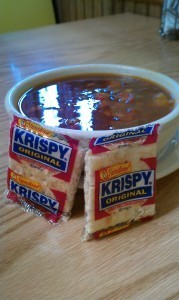
Back on the road.
Because they were starving and because of the name, they stopped to eat at the Ahrndt U Hungry. The girl ate a plate of cheese nachos so covered with cheese that finding a chip within was an excavatory process. The woman decided to add "excavatory" to her personal lexicon of words which don't exist but should.
She ate a bowl of soup with Krispy Original crackers. Then they got back in the car and kept heading west.
June 3, 2011
Turn around, turn around
 In the beginning there was the pink backpack, miniaturized for a kindergartner's small frame.
In the beginning there was the pink backpack, miniaturized for a kindergartner's small frame.
In the backpack was a brown paper bag: a peanut butter and jelly sandwich, an apple, a granola bar. And a note on a scrap of white paper. No words –this was a kindergartner who didn't yet know how to read– just a smiley face and X's and O's.
In the beginning there was a photo of the kindergartner getting off the school bus on the first day –huge smile– running up to her tall mother and throwing her arms around her legs.
In the beginning there were days and days when the kindergartner demanded elaborate hairdos of her non-hairdo-doing mother: multiple pigtails, barrettes, braids and butterfly clips.
In the beginning there was the year or three of striped shirts and flowered pants and polka dot socks.
Always, there was the brown paper lunch bag.
There were brief forays into School Lunch, forays which usually happened after careful study of the week's forthcoming School Lunch menu. Italian Dunkers, that was a good one. Pizza Day, another good one.
But the forays were brief, and then it was back to the brown paper lunch bag.
Years passed, and each fall brought with it a regular-sized backpack in a different color, shopping bags full of requested school supplies for an underfunded classroom, an agenda book covered over with hearts and flowers and swirly patterns and the names of all her friends.
Years passed, and so did the demands for a different hairdo each day. Soccer and tennis entered into the picture, along with the two-wheeler, the rollerblades, the ice skates, the skis.
The brown paper bag still held the usuals. A granola bar. A piece of fruit. Cut-up carrots or bell pepper. A cookie or two. A sandwich: peanut butter and jelly, turkey and cheese, a cream cheese + pickle roll-up.
The mother made the brown paper bag lunches in the early morning, while the girl was still asleep. Sometimes she turned on NPR, those soothing early morning voices muttering on about the weather, the wars, the stock market. Sometimes she worked in silence, the paper bag open on the counter behind the heavy wooden cutting board.
Wash the apple. Bag the sandwich. Which kind of granola bar today, chewy or regular?
The tiny notes continued for years –good luck on the history test! have a happy day! I'll see you at Poetry & Punch!– until one day the mother sensed that maybe it was time to stop sending notes in the lunch. That maybe the girl was a little too old now to want her friends to see her with a lunch note from her mother.
But the brown paper bag lunches continued. And the mother still made them. Occasionally this fact became known.
Your mother still makes your lunch?
Yup!
The girl liked her mother to make her lunch, and the mother, although she would not always admit it, liked to make her daughter's lunch.
The years went by, and then came a day in spring, just two days ago, in fact, when the girl came zipping down the stairs . I'm late! I'm late! she sang, I need my lunch! and she plucked up the brown paper bag from the kitchen table and raced to the front door.
Then she turned –tall girl with those hazel eyes and those dark curls tumbling down her back– and looked back at the mother standing in the kitchen doorway.
This is my last school lunch, she said. Confusion and wonder spread over her face. This is the last school lunch you'll ever make for me, isn't it?
The mother nodded.
Later, when she opened the brown paper bag, the girl would find one last note inside, buried at the bottom beneath the bag of peeled and sliced carrots.
May 31, 2011
Musical note, part one
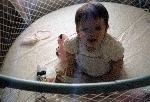 Across the street from your house is a small apartment building. Every so often, at the end of the month, someone will move out and someone else will move in. You sit in your upstairs office, the one with the green walls and the fuchsia and orange curtains –be not afraid of color– and glance out as you work.
Across the street from your house is a small apartment building. Every so often, at the end of the month, someone will move out and someone else will move in. You sit in your upstairs office, the one with the green walls and the fuchsia and orange curtains –be not afraid of color– and glance out as you work.
Cars and vans, sometimes a U-Haul, the sweating friends and family: in and out they go, tromping up and down the steps, lugging the bureau and couch and chairs and television. It's all so familiar. You yourself have moved quite a few times in just such a manner.
About a month ago, someone new moved in. You have no idea if this someone new is a man or a woman, but you do know that the someone new is a musician.
You know this because it's spring –finally, it's spring– and you took out the storms and put in the screens, and the spring breeze blows the curtains and your hair while you work. And while you work, classical violin music wafts from an upstairs window from the apartment building across the street.
At first you thought it was a fluke. You had managed to catch a child at practice. Maybe she goes to MacPhail School for Music, as does one of your own children, you thought, and she's been avoiding her practicing all week, but today is lesson day. Quick, better get in a few minutes of practice so you won't have to lie to the teacher.
But a few minutes later you knew you were wrong. This was no child desperately trying to dodge a stern teacher bullet. For one thing, it was the middle of the day on a school day, long after all the backpack-dragging children on the block had trudged to their bus stops. For another, this was serious music played by someone who had put in thousands and thousands of hours of practice.
That first day he (she? Some days you picture a woman, other days a man in a black suit) played for more than and hour and then stopped.
Oh. You were surprised at how sad this made you. That music was so beautiful. You, who are forever embarrassed at your un-knowledge about classical music, yet who love it anyway, in your naive way, didn't want that music to end.
Your phone rang and you plucked it up.
"Did you hear that?" said your next-door neighbor. "That gorgeous music?"
She too works at home, in an upstairs room that faces the street exactly as yours does. She too likes to look out on the street life as she works.
"It's amazing," you said. "Who is it?"
"No idea," she said. "But maybe we should go throw flowers up at their window. Do you think that would encourage them to keep going?"
But no flowers were necessary. Within an hour, the music had begun again, and on it went, for another hour. And on and off throughout the day, and the days, and the weeks, and now more than a month. Music is the center of the violinist's life.
Is there anything like that in your life? Any kind of gift you yourself can give the world, or your block, right here and right now, merely by trying to be better at something?
You can't delight the neighbors with the sound of your fingers clicking away on the keyboard, trying to be better at writing. You can't delight them with your singing, or your own preschooler piano playing. Maybe you can delight a few with the smell of baking cookies. Come the end of June through September, you might delight some with the hundreds of flowers which by then will be open and waving in the boulevard and front yard gardens.
But that violinist, all he has to do is stand before an open window and try to get better at what he already excels at, and the air around him fills with beauty.
May 28, 2011
Poem of the Week, by Hafiz
Happiness
– Hafiz
Ever since happiness heard your name
It has been running through the streets
Trying to find you.
–
For more information on Sufi poet Hafiz, please click here: http://www.poetryfoundation.org/bio/hafez
May 21, 2011
Poem of the Week, by Naomi Shihab Nye
Famous
– Naomi Shihab Nye
The river is famous to the fish.
The loud voice is famous to silence,
which knew it would inherit the earth
before anybody said so.
The cat sleeping on the fence is famous to the birds
watching him from the birdhouse.
The tear is famous, briefly, to the cheek.
The idea you carry close your bosom
is famous to your bosom.
The boot is famous to the earth,
more famous than the dress shoe,
which is famous only to floors.
The bent photograph is famous to the one who carries it
and is not at all famous to the one who is pictured.
I want to be famous to shuffling men
who smile while crossing streets,
sticky children in grocery lines,
famous as the one who smiled back.
I want to be famous in the way a pulley is famous,
or a buttonhole, not because it did anything spectacular,
but because it never forgot what it could do.
–
For more information on Naomi Nye, please click here.



